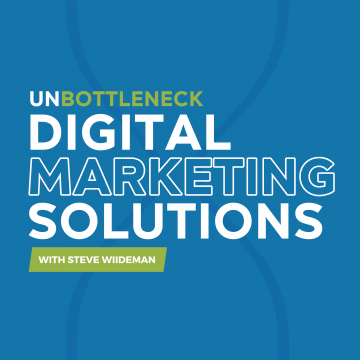Podcast: Play in new window | Download
In this episode of the Unbottleneck Podcast, Steve Wiideman is joined by content marketing expert A. Lee Judge to discuss creating valuable content with success that can be measured.
About Our Guest: A Lee. Judge
A. Lee Judge is Co-Founder and CMO of Content Monsta – a Marketing Content Production Agency with a focus on:
- Video Production
- Remote Podcast Production
- Remote Live Video Production
- Graphic Design
He is also Global Digital Marketing Manager for Hexagon Geosystems, an Official Member of the Forbes Agency Council and is based in Atlanta, Georgia.
Sponsored by Ryte
Featured in this episode:
- Properly Defining Content Marketing
- Confidently Share Your Ideas
- ROI: Everything Is Measurable
- Going Beyond a Content Calendar
What is Content Marketing?
Content marketing is a marketing strategy that involves creating and distributing valuable content (videos, podcasts, articles, etc.) to attract, engage or retain an audience. Content marketing is a gateway for businesses to:
- Build brand awareness
- Establish expertise and authority
- Increase conversions
However, it is much easier said than done. Developing a content marketing strategy can leave many feeling unclear about the next steps – What do I do? What should I write about? Do I need a blog? Do I need a sales page?
Well in this episode, A. Lee Judge will clarify many of these questions!
Confidence In Your Own Ideas: Toot Your Own Horn
Creating valuable content does not have to be overly complicated. The key is to become the content that others want to consume.
Oftentimes, people feel ashamed to talk about themselves because it feels like bragging. But when you’re building a brand, it is okay to put yourself out there to create content around who you are and your expertise, to help your audience become better acquainted with you, your business, and what you offer.
Catapulting yourself in front of a large audience can cause great anxiety, but here are some tips that can help alleviate those nerves as you navigate in those beginning stages:
- Loosen Up! – Everything does not have to be perfect. Don’t feel like you have to rely on big budget productions to create great content. Sometimes the best content is captured right on someone’s cell phone because it shows a level of authenticity that is not scripted and is not heavily centered around selling. To start off, think to yourself:
- Who am I?
- What are my qualifications?
- What type of solutions do I provide?
- What matters to my audience?
- Tell a Story! – People hate being bombarded with advertising. Therefore, don’t make selling your primary focus. Instead, work on building an authentic connection with your audience through storytelling.
ROI: Everything Is Measurable
A huge part of content marketing is not just publishing content, but measuring its performance and effectiveness in helping you meet business goals (i.e more leads, sales, reviews, etc.).
There are hard metrics and soft metrics that can be used to measure performance. Hard metrics consist of any measurable data such as website traffic, podcast downloads or customer reviews. Soft metrics cannot necessarily be measured, but it is an important attribute that focuses on quality and relationship management. Some examples of soft metrics include engagement, retweets, and video views.
While soft metrics are harder to measure, these metrics are actually the most important because the engagement and feedback is more telling when you’re hearing (and feeling) it directly from your audience.
Overall, you should be using both hard and soft metrics to measure how effective your content marketing strategy is.
Do I Need a Content Calendar?
A content calendar, or “editorial calendar”, is a useful tool that marketers use to plan, schedule and publish upcoming content. There are many content calendar tools available, but are they really necessary?
The truth is, content calendars are a great way to stay organized and meet deadlines, but many marketers can get trapped in a cycle of overwhelming their calendars with content. Rather than focusing on the quantity of content, focus on the quality of content you wish to publish. It’s a good practice to have a schedule, but you do not have to stick to a strict schedule of publishing content. You have the authority to show up in a meaningful way when it makes the most sense.
Pro-Tip: When planning your content calendar, try to align with seasonality. National Calendar Days can also be a fun way to add value and create conversations around the things people are talking about.
Keep up with the latest in SEO and content marketing strategies. Follow Steve on LinkedIn!




